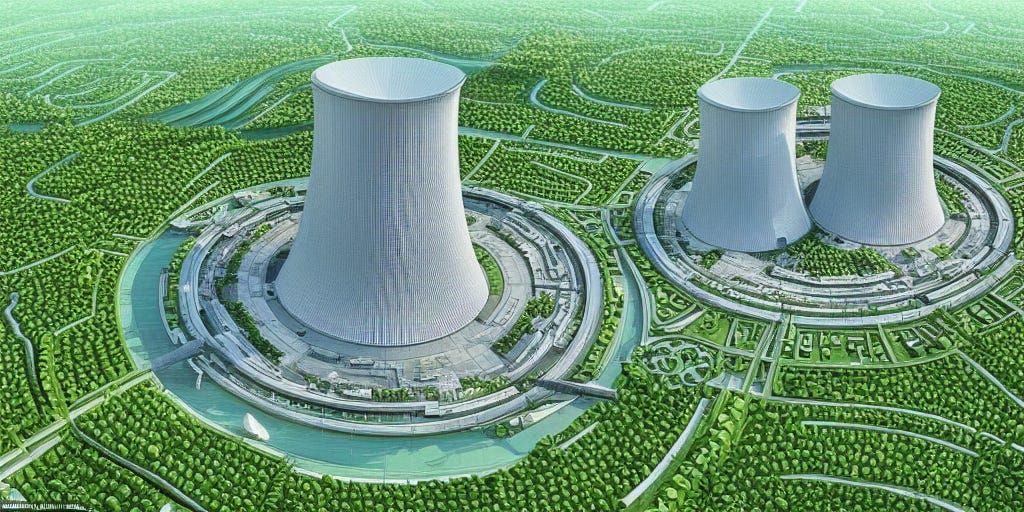⚛ What's next for the emerging Nuclear Renaissance?
5+ Quick Questions for ... policy analyst Alex Trembath of the Breakthrough Institute
Clean energy is a big Faster, Please! theme — and for good reason. We’re going to need a lot more of it to realize the abundant future that I regularly sketch in this newsletter. So for 5 Quick Questions, I asked Alex Trembath about how the recently signed Inflation Reduction Act affects the emerging nuclear renaissance, whether that renaissance has staying power, something called “ecomodernism,” and much more.
Alex is Deputy Director at the Breakthrough Institute, a think tank dedicated to promoting technological solutions to environmental and human development challenges. Breakthrough is known for its ecomodernist perspective, which Alex details below. He’s passionate about energy and climate — but with an Up Wing, pro-progress approach that fits right in here at Faster, Please!
Check back on Thursday for part two of my Q&A with Alex in which we talk about regulatory reforms, the future of fusion and geothermal, and more!
1/ What is ecomodernism?
Ecomodernism is a school of thought that we sort of incubated at my think tank, the Breakthrough Institute. It's a new way of thinking about environmental problems that is predicated on progress, on optimism, on technology, and on economic growth. What we share with conventional environmentalism is that non-human nature is worth something to us and should be protected, and we should have some stewardship over it. What we don't share is the conviction that human systems need to “harmonize” with non-human nature. We believe we need to decouple from non-human nature through technological innovation, through economic growth. When we have low-carbon technologies, high-productivity agriculture, we have an increasingly dematerializing economy, we find that continued economic growth, innovation, deployment of technology and infrastructure can not just help humans, but can help solve environmental problems. So that's where ecomodernism came from.
2/ From an ecomodernist perspective, what do you like and dislike about the Inflation Reduction Act?
In order to grapple with the climate crisis, you really have to create a whole new energy economy, a whole new energy abundance on top of the old one. You're not going to regulate or limit your way out of it. You need much cheaper and more scalable low-carbon energy technologies of the kinds that we've seen significant progress in over the last 10, 15, 20 years as solar has gotten a lot cheaper [and] batteries have gotten a lot cheaper. The Inflation Reduction Act totally follows that playbook. It's making big investments in low-carbon technologies, and what's especially promising is it's doing it in a very technologically inclusive way. It’s got big investments for tax credits for solar and wind, but also for geothermal, for advanced nuclear, for hydrogen. And this is true across the innovation pipeline, as it's called. There's funding for deployment, but also funding for demonstration of new technologies.
Which leads to the parts of the bill that I'm less excited about. Most of the money is actually expected to go towards solar and wind, which makes sense. Those are the sort of marginally competitive technologies in electricity markets today. As a result, that's where we expect most of the emissions reductions to come from. But I think perpetually subsidizing what everyone agrees are pretty competitive, cheap technologies today is a bit of a trip wire in the legislation. But obviously you see why that happens: That's the low-hanging fruit. You're not going to get a ton of emissions reductions from advanced nuclear or enhanced geothermal in the next few years.
What I'm more concerned about is that the Inflation Reduction Act was passed on a bit of a handshake deal between Senator Manchin and leadership over permitting reform, which is alleged to be coming down the pike sometime this fall, which I don't really believe will happen. What Manchin and an increasing number of folks are saying is that we've got increasingly cheap low-carbon technologies, we're trying to electrify transport, heating, sort of industrial processes—that's going to require a lot more energy infrastructure. [But] the environmental regulatory regime that we set up in the 20th century is just a straight obstacle to building a bunch of that infrastructure. Manchin seems to know this, and that's why he wanted to pair permitting reform with the almost $400 billion down payment that we're putting towards building that infrastructure. But I think that is not remotely a done deal.
I think there’s going to be lots of opposition from progressives and environmentalists against permitting reform. And I think that is a huge problem that will absolutely impede the expectations people have for the Inflation Reduction Act. The big models—the Repeat Project, the Rhodium Group, Energy Innovation LLC—all expect something like 40 percent emissions reductions below 2005 levels by 2030. My guess is we won't hit that, or probably much close to it, without significant permitting reform in the next few years to make it easier to build long-distance transmission lines, to make it easier to build solar and wind projects and geothermal plants and things like that.
Keep reading with a 7-day free trial
Subscribe to Faster, Please! to keep reading this post and get 7 days of free access to the full post archives.

